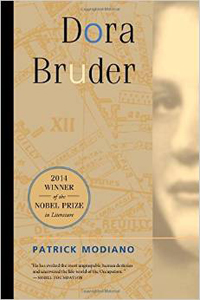 Patrick Modiano, Dora Bruder (Paris: Éditions Gallimard, 1997) and (Oakland: University of California Press, 1999, 2015), 119pp.
Patrick Modiano, Dora Bruder (Paris: Éditions Gallimard, 1997) and (Oakland: University of California Press, 1999, 2015), 119pp.
In December of 1988, the French novelist Patrick Modiano (b. 1945) happened to read a missing person notice in a 1941 issue of the French newspaper Paris Soir. A fifteen-year-old girl named Dora Bruder had run away from her convent boarding school where her parents had placed her during the Nazi Occupation. Dora's parents had placed the ad. This led Modiano on a ten-year search to learn everything he could about Dora, which wasn't much. And his search for Dora leads to personal meditations on his own family history.
Dora Bruder is a hybrid book — part biography, part memoir, and part historical reconstruction that's based upon assumptions, conjectures, and imaginative leaps. The Paris of today has changed — street addresses that no longer correspond to any building, suburbs that have reconfigured the city of Modiano's youth, hotels and schools that no longer exist. Modiano finds a few photographs, discovers the odd newspaper clipping, locates historical documents like police registers, and hears the fuzzy memories of a few people who lived at the same time as Dora. He also finds Dora listed on a list of Jews deported from Paris to Auschwitz in September 1942.
Dora commands our interest precisely because of her ordinariness. A single person among six million deaths. She came from the sort of Jewish family "who leave few traces. Virtually anonymous. Inseparable from those Paris streets, those suburban landscapes where, by chance, I discovered that they had lived. Often, what I know about them amounts to no more than a simple address. And such topographical precision contrasts with what we shall never know about their life — this blank, this mute block of the unknown."
Modiano evokes the dark days of the Occupation — the curfews, internments, roundups, ghettos, forced registrations, yellow stars and shaved heads. Why did Dora run away from the safety of her school that was hiding her, only to end up in Auschwitz a few months later? Modiano links the past and the present, his own family's history with that of Dora's. When Modiano won the Nobel Prize in Literature in 2014, it was "for the art of memory with which he has evoked the most ungraspable human destinies and uncovered the life-world of the occupation." This slender volume, now translated into twenty languages, is a good example of the reason for that accolade.


